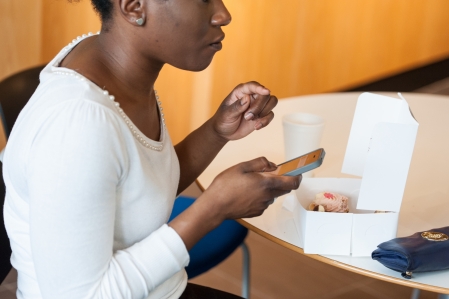
Amanda Prout joined the urology team at Rotherham Hospital last November. As a Macmillan Cancer Support Worker Amanda works alongside the urology clinical nurse specialist in supporting patients diagnosed with cancer. This can include prostate, renal, bladder or testicular cancer.
The role of a Macmillan Support Worker involves talking to people during or just after a diagnosis of cancer, including listening to people’s concerns and providing self-care advice, Amanda explains:
“ So many things can be running through a person’s head after they hear that diagnosis of cancer. My role helps signpost people to the appropriate support for them during that difficult time.
“There is so much fantastic local support in Rotherham but people need to know where they can access it, I remove that complication.
“Support can range from benefits advice, emotional or psychological therapy, support for carers or Macmillan information on what happens next.
“I check in with patients over the phone, they’ve also got my contact details should they have any queries, and if we need to we can get them back in to speak to a nurse sooner.
“I work very closely with the clinical nurse specialist on the team, patients find this reassuring that we’re communicating for the same outcome; the best care and support we can provide for that individual.”
The innovative role of the Macmillan Cancer Support Worker is the first of its kind within cancer services at The Rotherham NHS Foundation Trust. The post is being trialled for three years, as part of The Macmillan Living With And Beyond Cancer Programme.
Michelle Fletcher, Macmillan Living With And Beyond Cancer Programme Manager for Rotherham, helped to secure funding for the pilot in the town, she explains:
“This kind of individual support is more than a phone call or information leaflet, patient’s feel they can call Amanda and trust that she’ll act to help them.
“The Macmillan funding we’ve been allocated has allowed us to trial this new way of working and given us the space to work out what patients need at diagnosis and beyond.”
Although the team has not completed their formal evaluation they have reported an increase in the number of patients they have been able to support following Amanda’s appointment, up to 40 patients in January 2018, compared with 14 patients in January 2017.
Amanda’s frontline role also allows her and the team to identify any gaps in support that exist, she explains:
“As a team we’re hoping to set up a prostate cancer support group, we’re currently talking to people affected by prostate cancer to understand how the group should work.
“We know people are faced with so many unknowns when they hear the diagnosis of cancer, we want to ensure that there’s a group where people can come and talk about their shared experience.”
To find out more about The Macmillan Living With And Beyond Cancer Programme.
